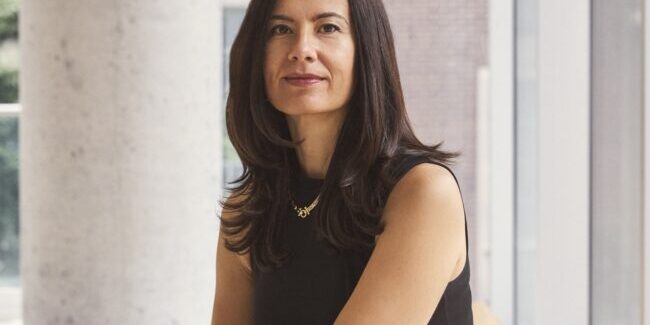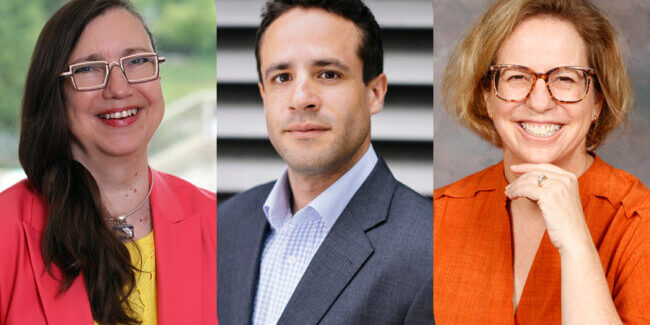
Mechanical & Industrial Engineering Professor Olivera Kesler wants to bring synergy to sustainable energy. Professor Kesler is the Director of the Centre for Sustainable Energy (CSE). Her job is to weave together all the separate strands of energy research and innovation on campus at the University of Toronto into a strong, collaborative fabric. Her goal is to unite the dozens of teams of researchers, educators, students and partners scattered in the faculties, buildings and labs in downtown Toronto.
The end game? To make sure that conversation, community and collaboration happen among the fine minds working on supplying the demanding world with earth-sensitive energy.
Kesler’s admirably suited to the task. She’s a passionate sustainable energy proponent, an avid cyclist and the Canada Research Chair in Fuel Cell Material and Manufacturing. Her specific research focuses on sustainable solid oxide fuel cells, including ones using coal gas as a fuel while producing efficient energy with zero pollutants.
But the Centre’s mandate goes much wider, embracing not only engineering expertise and research, but also the political, sociological and culture implications and impacts of energy shortage and inequity.
“Clean energy has been my primary interest since the beginning of my career. I’m biased, but I think it’s the number one most crucial issue that we face for our species and for the other species with which we share the planet,” she says. “The goal of the Centre is to bring all these people together to work on the same vital issue,” Kesler adds. “We need to be as inclusive as possible. The Centre is fully interdisciplinary. The only barrier for participation is people’s individual time constraints.”
The first task was the creation of a growing website that attempts to pull together all the clean energy activities and research on campus.
“Someone coming to the site may just want information on what U of T is doing about wind energy, regardless of department. They might not know that Aerospace is doing research in that area, or that a place where airplanes are studied also study wind turbines, but they can find it on the site,” she said.
“Our role is really to facilitate the connection between different groups and hopefully engender new research as a result of those relationships. The research was already going on here. We’re just giving it more visibility for people who may not have known what was going on here, its scope and where the research was taking place,” she says.
Since the Centre has launched in March 2010, it has hosted seminars on energy-related topics and has helped promote events held by other groups on campus or elsewhere in Toronto – if they’ve been energy related.
And, Kesler says in the future she’d like to see the Centre take on an increasing advocacy role, offering public seminars. This includes an Energy Showcase that took place in May 2011, at which officials involved in energy policy presented public lectures that stressed the political and societal issues associated with sustainable energy.
“We’ve also got folks involved in life cycle research trying to assess the full life cycle costs of different technologies. We intend to provide the public with as much information as possible about these issues. Often public and political choice is economic.”
Faculty of Applied Science & Engineering Dean Cristina Amon says the young Centre is actively seeking funding for its endeavours. “[The Canadian engineering firm] HATCH provided a $1 million endowment for fellowships for graduate students studying sustainability and sustainable energy. That endowment was matched one-to-one by the federal government,” she said.
Electrical & Computer Engineering Professor Stewart Aitchison, the U of T Engineering’s Vice-Dean of Research, believes the Centre is perfectly aligned with the Faculty’s future vision. “Sustainable energy is one of our key research areas in our strategic plan moving forward. The Centre will become a nucleus for that activity.”
A $1.65 million, six-year CREATE (Collaborative Research and Training Experience) grant for the Centre’s work has already been awarded by NSERC (Natural Sciences and Engineering Research Council of Canada). The funding, led by Dean Amon and Assistant Professor Aimy Bazylak, will provide graduate students with additional specialized training.
He said additional funding for Centre research could come from provincial and federal government, as well as from industry.
“We have engineers working on all facets of the renewable energy issue: solar, wind, even tidal, but we can also tie into researchers in arts and science, as well as medicine that look at other aspects of renewable energy. We can work with folks in social science to look at the impact of harvesting crops for bio-diesel or for food. That’s where our uniqueness lies — in our amazing diversity of expertise,” Aitchison explains.



